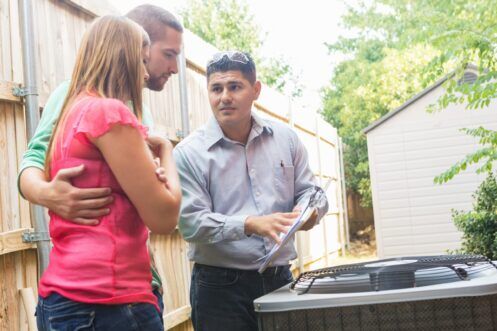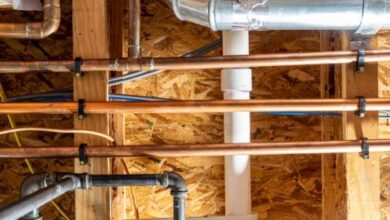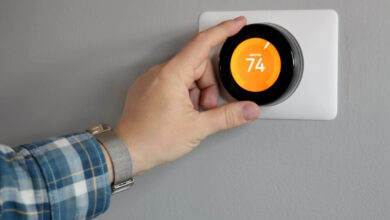Heat Pump Maintenance: What to Expect During Service


Whether you’re keeping your home warm in the winter or cool in the summer, a heat pump is a great option. Since they provide both heating and cooling, you can meet all of your heating and cooling needs in a single system. To keep your heat pump running at its best, it’s important to schedule regular maintenance. Keep reading to find out more about what you can expect during professional heat pump maintenance.
Why Heat Pump Maintenance Matters
Routine maintenance is important for your comfort and the long-term health of your system. Heat pumps have multiple components that all need to operate smoothly. Even minor issues can reduce efficiency and increase energy bills.
Seasonal Checks: Preparing for Heating and Cooling
Heat pumps operate year-round, which means seasonal preparation is crucial. In the fall, maintenance helps to make sure that your system is ready for cold weather. In the spring, our team will prepare it to keep your home cool during the hotter months.
During these seasonal checks, we evaluate how your heat pump performs in both heating and cooling modes. We inspect ductwork for leaks and make sure the system transitions smoothly between seasons. We will also adjust thermostat settings. Preparing your heat pump for seasonal changes helps maintain comfort throughout the year and reduces the risk of mid-season breakdowns.
Cleaning and Inspecting Coils
The evaporator and condenser coils are important for transferring heat efficiently. Dust and debris can easily build up in your system, which will reduce your system’s performance and force it to work harder. Maintenance involves cleaning these coils and inspecting them for signs of damage.
Early detection of issues prevents major problems that could compromise your system. Clean coils improve energy efficiency and help your heat pump provide consistent comfort across your home.
Checking and Replacing Filters
Filters trap airborne particles while protecting the internal components of your heat pump. Over time, they can clog, which restricts airflow, reduces efficiency, and lowers indoor air quality.
During maintenance, professionals inspect filters and replace or clean them as needed. Proper filtration ensures consistent airflow, healthier indoor air, and reduced strain on your system, helping your heat pump operate more efficiently.
Inspecting Refrigerant Levels and Lines
Refrigerant helps to enable your heat pump to absorb and release heat efficiently. Low refrigerant levels will reduce heating and cooling performance. It can also increase energy costs because it is not as efficient. Maintenance includes checking refrigerant levels and refilling the system if necessary. Our team will also check for leaks.
Electrical System and Component Checks
Electrical components, like wiring and control boards, are important for your heat pump’s operation. Faulty connections in your system can lead to short cycling. During a maintenance session, our team will test electrical components and tighten loose connections.
Fan Motors and Blower Maintenance
The fans and blower in your system will circulate air throughout your home. Dirt buildup and worn motors can decrease your airflow. Maintenance sessions involve cleaning fan blades and lubricating motors. We will also check your system for unusual noises or vibrations. Properly functioning fans make sure that your system has even airflow and provides consistent comfort in every room.
Ductwork and Airflow Inspection
Even a well-maintained heat pump will struggle if your ductwork leaks or becomes blocked. Gaps, loose connections, and debris reduce airflow, waste energy, and create uneven temperatures in your home. During maintenance, professionals inspect ductwork for leaks and obstructions. Repairing these issues will help to improve airflow, energy efficiency, and indoor air quality, so your heat pump delivers comfort consistently throughout your home.
Thermostat and Control Calibration
Miscalibrated thermostats can cause temperature swings, short cycling, and higher energy costs. Maintenance includes calibrating the thermostat to make sure it is able to communicate with your heat pump accurately. Our team may also suggest updating your smart thermostat and optimizing your settings, keeping your home comfortable while maximizing efficiency.
Condensate Drain Cleaning
Heat pumps produce condensation, which drains through a condensate line. Over time, algae and mold can block the line. Maintenance includes our team inspecting and cleaning the condensate drain to prevent clogs. Clear drains protect your home from water damage and help your system maintain proper humidity levels.
The Benefits of Regular Heat Pump Maintenance
Keeping your heat pump in optimal condition prevents breakdowns, and it impacts your comfort and your energy bills. Routine maintenance means that your heat pump can operate more efficiently, which helps to reduce unexpected repair costs.
Improved Efficiency
Routine heating maintenance makes sure that all components operate at peak efficiency. Clean coils, proper refrigerant levels, and unrestricted airflow reduce your overall energy consumption, which will help you save money on utility bills. You also decrease the strain on your system, which prevents costly repairs and extends its lifespan.
Enhanced Comfort
When your heat pump is able to operate efficiently, it maintains consistent temperatures in every room. You avoid cold or hot spots and sudden fluctuations that can make your home uncomfortable. Properly calibrated thermostats and clean components will help create a smooth climate.
Better Indoor Air Quality
Maintenance keeps filters, coils, and ductwork free from dust and debris. By reducing allergens and airborne particles, your heat pump helps everyone in your home breathe easier. This is important for children, seniors, and individuals with allergies or respiratory conditions.
Longer Lifespan
Heat pumps are a major investment in your home. Regular maintenance helps keep small issues from becoming major failures, which will allow your system to last well beyond a decade.
Peace of Mind
Knowing your heat pump has been professionally serviced provides reassurance that it will perform reliably in extreme weather. You can relax knowing that your home will stay comfortable, and you won’t face emergency repairs when you least expect them.
Environmental Impact
Efficient heat pumps use less energy, which lowers your household’s carbon footprint. When you maintain your system, you reduce energy consumption, helping conserve resources and contribute to a healthier environment.
Scheduling Maintenance
We recommend scheduling maintenance for your system twice a year. In the spring, before you need the cooling system, and again in the fall before the heating season starts. Seasonal maintenance allows us to identify any issues early, preventing minor problems from escalating.
Spring maintenance focuses on preparing your system for the warmer months. We will inspect the cooling components, check refrigerant levels, and make sure your air filters and ductwork are in optimal condition. Fall maintenance will prepare your heating system for winter. We will inspect the heat exchanger, verify the thermostat and electrical connections, and ensure that you have optimal airflow. Regularly scheduled maintenance also helps preserve your warranty. Many heat pump manufacturers require proof of professional upkeep to honor certain warranty claims.
An HVAC Company to Rely On
Regular heat pump maintenance will provide you with comfort that you can rely on and improved energy efficiency for your system. At Rosenberg Plumbing & Air, we have served the San Antonio area for over 37 years. Do not wait for unexpected breakdowns; trust us with your HVAC needs. Contact Rosenberg Plumbing & Air today to schedule heat pump maintenance.
Tags: heat pump maintenance, HVAC Tips




